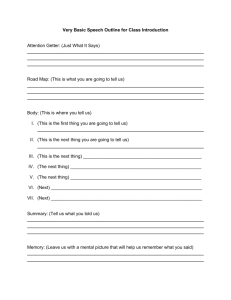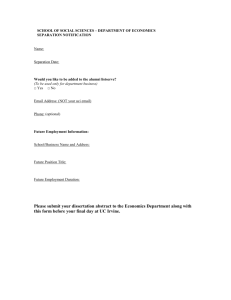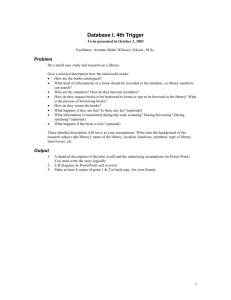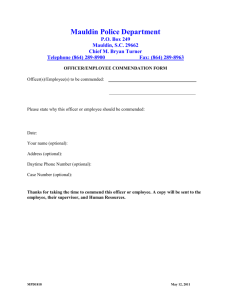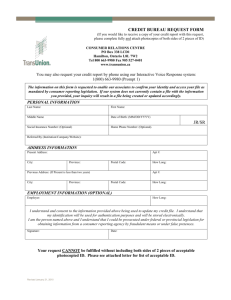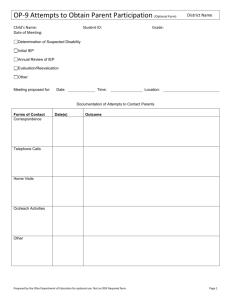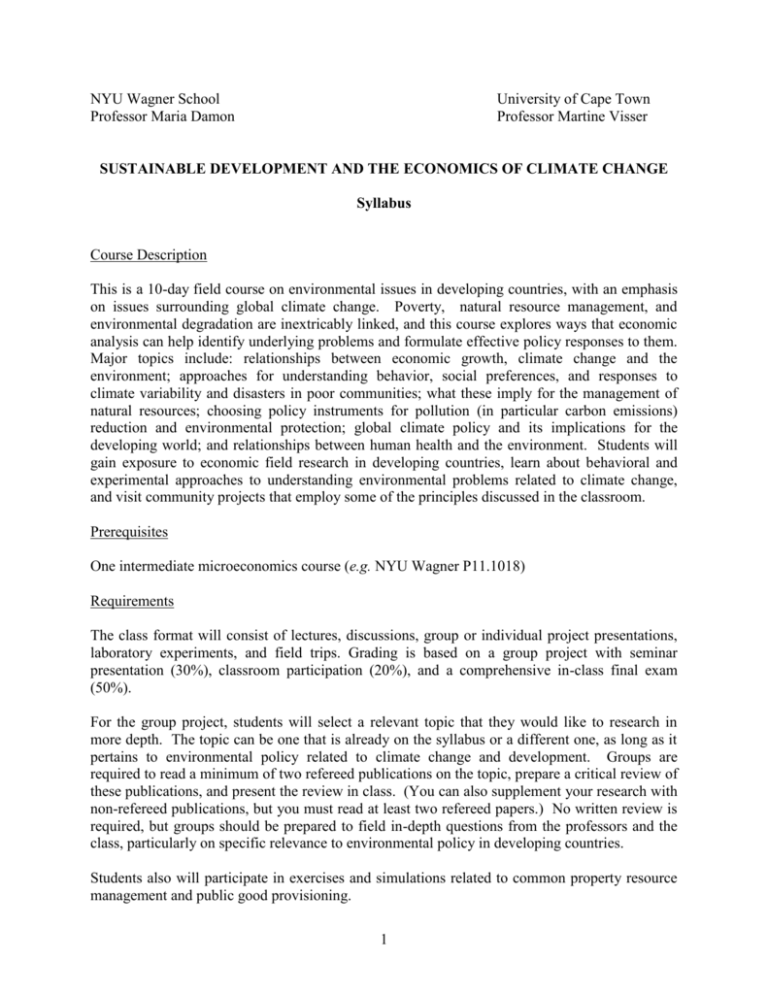
NYU Wagner School
Professor Maria Damon
University of Cape Town
Professor Martine Visser
SUSTAINABLE DEVELOPMENT AND THE ECONOMICS OF CLIMATE CHANGE
Syllabus
Course Description
This is a 10-day field course on environmental issues in developing countries, with an emphasis
on issues surrounding global climate change. Poverty, natural resource management, and
environmental degradation are inextricably linked, and this course explores ways that economic
analysis can help identify underlying problems and formulate effective policy responses to them.
Major topics include: relationships between economic growth, climate change and the
environment; approaches for understanding behavior, social preferences, and responses to
climate variability and disasters in poor communities; what these imply for the management of
natural resources; choosing policy instruments for pollution (in particular carbon emissions)
reduction and environmental protection; global climate policy and its implications for the
developing world; and relationships between human health and the environment. Students will
gain exposure to economic field research in developing countries, learn about behavioral and
experimental approaches to understanding environmental problems related to climate change,
and visit community projects that employ some of the principles discussed in the classroom.
Prerequisites
One intermediate microeconomics course (e.g. NYU Wagner P11.1018)
Requirements
The class format will consist of lectures, discussions, group or individual project presentations,
laboratory experiments, and field trips. Grading is based on a group project with seminar
presentation (30%), classroom participation (20%), and a comprehensive in-class final exam
(50%).
For the group project, students will select a relevant topic that they would like to research in
more depth. The topic can be one that is already on the syllabus or a different one, as long as it
pertains to environmental policy related to climate change and development. Groups are
required to read a minimum of two refereed publications on the topic, prepare a critical review of
these publications, and present the review in class. (You can also supplement your research with
non-refereed publications, but you must read at least two refereed papers.) No written review is
required, but groups should be prepared to field in-depth questions from the professors and the
class, particularly on specific relevance to environmental policy in developing countries.
Students also will participate in exercises and simulations related to common property resource
management and public good provisioning.
1
SCHEDULE:
Sunday, January 8th
Arrival and check-in
Monday, January 9th
Morning:
Course Introduction
Environmental Economics in the International Development Community
Climate Change – Historical background, scientific projections, and global policy
Lecturers: Maria Damon and Thomas Sterner
Afternoon:
Orientation, presented by University of Cape Town staff
City tour of Cape Town (TBD)
Tuesday, January 10th
Morning:
The Growth-Environment Relationship
Poverty and the Environment – linkages at the household level
Green Accounting
Sustainability – definitions and implications
Lecturers: Maria Damon and Thomas Sterner
Afternoon:
Excursion to the South African Museum (oldest museum in Cape Town;
exhibitions on the natural history, biological, and cultural resources of South
Africa.) and District Six Museum (established in December 1994; devoted to
memories of forced removals under Apartheid, and to “stimulating the recovery
and development of different forms of knowledge of the city, identity and
community”)
Wednesday, January 11th
Morning:
Environmental Policy Instruments in Developing Countries
International Climate Policy
Fairness and Distributional Issues
Lecturers: Martine Visser, Ant Dane, and Thomas Sterner
Afternoon:
Off (time to start work on group/individual projects)
2
Thursday, January 12th
Morning:
Site visit to Harvest of Hope – a community garden project in Khayelitsha:
http://harvestofhope.co.za/
Lunch with Hotbox – uses the principle of insulated cooking to reduce fuel-wood
consumption: http://www.thehotboxco.co.za/
Afternoon:
Kuyasa CDM Project tour in Khayelitsha – a carbon finance pilot project
involving the retrofitting of solar water heaters, insulated ceilings, and energy
efficient lighting in low-cost homes: http://www.kuyasacdm.co.za/index.php
Friday, January 13th
Morning:
Environmental and Social Institutions and Externalities
Common Property Resources
More on Fairness and Distributional Issues
Lecturer: Professor Martine Visser
Afternoon:
In-class practical – students participate in a behavioral experiment related to
common property resource management, public goods, and climate risk.
Saturday, January 14th
Class excursion to Cape Point; visit fishing communities along the way.
Sunday, January 15th
Day off. Optional excursion to local wineries and Robben Island.
Monday, January 16th
Morning:
Climate Variability and Risk Taking Behaviour: Experimental evidence from
Southern and Eastern Africa
Lecturers: Martine Visser and Maria Damon
Afternoon:
Research session – “Office hours” with professors and time to work on projects
3
Tuesday, January 17th
Morning:
Cost-Benefit Analysis
Environmental Valuation
Intergenerational Tradeoffs and Discounting
Lecturer: Maria Damon
Afternoon:
Student project presentations
Wednesday, January 18th
Morning:
Vulnerability to Climate Change of Agriculture and Rural Municipalities
Costs of Adaptation
Lecturers: Jane Turpie and Herbert Ntuli
Afternoon:
Off (time to study for final exam)
Thursday, January 19th
Morning:
Final Exam (1.5 hours)
Sustainability – looking forward, and a closing policy perspective
Evening:
Closing Dinner
4
READINGS:
The following table lists the required readings for each lecture. Reading assignments should be
completed in advance of class and, given the condensed nature of the course, it is suggested that
students read as much as possible before the course begins. Additional optional readings are
listed and, while these are recommended, they are not required. If students would like to read
more about any particular topic, the professors are of course happy to suggest further
supplemental readings upon request.
Date
Readings
Jan 9
Environmental Economics in the International Development Community
World Bank, World Development Report 1992: Development and the
Environment (Oxford University Press, New York, 1992) – “Overview” (pp. 124) – Just skim this reading to compare themes to the 2003 report .
World Bank, World Development Report 2003: Sustainable Development in a
Dynamic World (Oxford University Press, New York, 1992) – “Roadmap” and
Chapter 1 (pp. xiii-11)
OPTIONAL: Toman, Michael, 1994. "Economics and Sustainability: Balancing
Tradeoffs and Imperatives" Land Economics 70: 399-413.
Climate Change – Historical background, scientific projections, and global policy
J. W. Anderson (2006) “How Climate Change Policy Developed: A Short
History” The RFF Reader in Environmental and Resource Policy, 2nd edition,
RFF Press.
IPCC Working Group (2007) “Summary for Policy Makers: Impacts, Adaptation,
and Vulnerability: Fourth Assessment Report of the Intergovernmental Panel on
Climate Change.
Robert Stavins “Assessing the Climate Talks — Did Durban Succeed?” Blog
post, December 12, 2011,
http://www.robertstavinsblog.org/2011/12/12/assessing-the-climate-talks-diddurban-succeed/
Jan 10
The Growth-Environment Relationship
R.T. Carson (2010), “Environmental Kuznets Curve: Searching for Empirical
Regularity and Theoretical Structure” Review of Environmental Economics and
Policy 4, 3-23.
OPTIONAL: Gene M. Grossman and Alan B. Krueger, “Economic growth and
the environment” (Quarterly Journal of Economics 110:353-377, 1995)
OPTIONAL: David I. Stern, “The rise and fall of the environmental Kuznets
curve” (World Development 32:1419-1439, 2004)
Trade and the environment: the pollution-haven hypothesis
M. Scott Taylor (2004) “Unbundling the pollution haven hypothesis” Advances in
5
Economic Analysis & Policy 4(2) – pp. 1-6 and 21-23; skip Sections 2.1-2.4.
OPTIONAL: Beata Smarzynska Javorcik and Shang-Jin Wei (2004) “Pollution
havens and foreign direct investment: dirty secret or popular myth?” Advances in
Economic Analysis & Policy 3(2).
OPTIONAL: Josh Ederington, Arik Levinson, and Jenny Minier (2005)
“Footloose and pollution-free” Review of Economics and Statistics 87(1): 92–99.
Poverty and the environment
Partha Dasgupta (2003) “Population, poverty, and the natural environment,” Ch.
5 in Handbook of Environmental Economics, Volume 1, North-Holland,
Amsterdam – Sections 1-3, 5, 9-10 (pp. 193-203, 213-216, 224-235)
OPTIONAL: World Bank (2008) Poverty and the Environment: Understanding
Linkages at the Household Level, Washington, D.C.: Ch. 1-2 (pp. 5-30)
Green accounting
World Bank, Where is the Wealth of Nations? (World Bank, Washington, D.C.,
2006) – Ch. 1-2 (pp. 19-32)
OPTIONAL: Lange, Glenn-Marie and Rashid Hassan, “Accounting for the
Environment: Experiences from Southern Africa,” Paper presented at the launch
of the Environmental Economics Policy Forum for Ethiopia, January 9, 2003.
OPTIONAL: World Bank, Where is the Wealth of Nations? (World Bank,
Washington, D.C., 2006) – Ch. 3 and Appendix 1 (pp. 35-47, 143-158)
OPTIONAL: Susana Ferreira and Jeffrey R. Vincent, “Genuine savings: leading
indicator of sustainable development?” (Economic Development and Cultural
Change 53:737–754, 2005)
The resource curse
OPTIONAL: Jeffrey D. Sachs and Andrew M. Warner (2001) “The curse of
natural resources” European Economic Review 45, 827-838.
OPTIONAL: Michael Alexeev and Robert Conrad (2009) “The elusive curse of
oil” The Review of Economics and Statistics 91(3) [Read the introduction; the
remainder is optional reading, and requires an understanding of multivariate
regression.]
OPTIONAL: Gavin Wright and Jesse Czelusta, “Why economies slow: the myth
of the resource curse" (Challenge 47(2):6-38, 2004)
Jan 11
Environmental policy instruments in developing countries
Perman, R., Ma, Y., McGilvary, J. and M. Common (2003) Natural Resource
and Environmental Economics, 3rd Edition, Pearson Addison Wesley. Chapter 7.
Sterner, T. (2003) Policy Instruments for Environmental and Natural Resource
Management, The World Bank and Resources for the Future. Chapters 1 and 19.
“Green Growth in the Post-Copenhagen Climate”, Thomas Sterner and Maria
Damon, Energy Policy, in press.
6
RFF Weathervane, “Changes In Market Mechanisms: The CDM Without China”,
by Lynann Butkiewicz, posted: 08/31/11.
OPTIONAL: Hanley, N., Shogren, J. F., and B. White (2007) Environmental
Economics - In Theory and Practice, 2nd Edition, Palgrave MacMillan. Ch. 4-5.
OPTIONAL: Tietenberg T.H. (1990). ”Economic instruments for environmental
regulation”. Oxford Review of Economic Policy 6: 17-33.
OPTIONAL: “Getting REDD Right - Reducing Emissions from Deforestation
and Forest Degradation (REDD) in the United Nations Framework Convention
on Climate Change (UNFCCC)” from Environmental Defense Fund, Woods Hole
Research Center and Instituto de Pesquisa Ambiental da Amazônia (IPAM).
OPTIONAL: Sterner, T. (2003) Policy Instruments for Environmental and
Natural Resource Management, The World Bank and Resources for the Future.
Ch. 10, 12, and 18.
Jan 12
Field trips – no readings assigned.
Jan 13
Environmental and Social Institutions; Common Property Resources
Hardin, Garrett, (1968) “The Tragedy of the Commons,” Science 162: 12431248.
Heyward, M. 2007. Equity in international climate change and negotiations: a
matter of perspective. Climate Policy,7 (2007): 518-534
Lange, A., Vogt, C. and Ziegler, A (2007) “On the importance of equity in
international climate policy: An empirical analysis,” Energy Economics 29
(2007) 545–562.
Ringius, L., Torvanger, A., Underdal, A., 2002, “Burden Sharing and Fairness
Principles in International Climate Policy,” International Environmental
Agreements: Politics, Law and Economics, 2: 1-22.
Saran, S., 2010, “Irresistible forces and immovable objects: a debate on
contemporary climate politics,” Climate Policy, 10:678 – 683.
OPTIONAL: Hasson, Reviva, Åsa Löfgren, and Martine Visser (2009) "Climate
Change in a Public Goods Game: Investment Decision in Mitigation versus
Adaptation", EfD Discussion Paper 09-23, Environment for Development
Initiative and Resources for the Future. Forthcoming in Ecological Economics.
OPTIONAL: Brick, K. and Visser, M (2010), “Meeting a National Emission
Reduction Target in an Experimental Setting,” Forthcoming in Climate Policy.
OPTIONAL: Brekke, K., Johansson-Stenman, O., 2008, “The behavioral
economics of climate change,” Oxford Review of Economic Policy, 24(2).
OPTIONAL: Carlsson, Frederik, M. Kataria, A. Krupnick, E. Lampi, Å.
Löfgren, P. Qin, T. Sterner, and S. Chung, 2010. "A Fair Share - Burden-Sharing
Preferences in the United States and China," Jena Economic Research Papers
2010-074, Friedrich-Schiller-University Jena, Max-Planck-Institute of
Economics.
7
Jan 16
Climate Variability and Risk Taking Behaviour: Experimental evidence from
Southern and Eastern Africa
Hanley, Shogren and White, Introduction to Environmental Economics, Oxford
University Press, Ch. 5, pp. 94-119.
Perman, R., Ma, Y., McGilvary, J. and M. Common (2003). Natural Resource
and Environmental Economics, 3rd Edition, Prentice Hall, UK. Irreversibility,
Risk and Uncertainty, Chapter 15.
Fisher, A.C. (2001) Uncertainty, irreversibility and the timing of climate change.
available electronically at:
http://stephenschneider.stanford.edu/Publications/PDF_Papers/timingFfisher.pdf
Patt, A. Suarez, P. and Ulrich, H (2010) “How do small-holder farmers
understand insurance, and how much do they want it? Evidence from Africa,”
Global Environmental Change 20 153–161
OPTIONAL: Maria Damon, Joshua Graff Zivin, and Harsha Thirumurthy (2010),
“Health Shocks and Natural Resource Management: Evidence from Western
Kenya”, Working paper.
OPTIONAL: Alpizar, Francisco, Fredrik Carlsson, and Maria Naranjo (2009),
"The Effect of Risk, Ambiguity, and Coordination on Farmers' Adaptation to
Climate Change: A Framed Field Experiment", EfD Discussion Paper 09-18.
OPTIONAL: Gine, X. and D. Young. 2009. Insurance, credit, and technology
adoption: Filed experimental evidence from Malawi. Journal of Development
Economics, 89: 1-11.
Jan 17
Environmental Valuation
Krupnick, A. and Juha Siikamaki. “How people value what nature provides.”
Resources. Spring 2007: 14-16.
Intergenerational Tradeoffs and Discounting
Brennan, T. (2006) “Discounting the Future: Economics and Ethics” The RFF
Reader in Environmental and Resource Policy, 2nd Edition, Wallace E. Oates,
editor, Washington: Resources for the Future.
Nordhaus, W. (2007) “Critical Assumptions in the Stern Review on Climate
Change.” Science 317: 201-202
Stern, N., and C. Taylor (2007) “Climate Change: Risk, Ethics, and the Stern
Review.” Science 317: 203-204.
OPTIONAL: Nicholas Stern (2006) “The Economics of Climate Change: The
Stern Review,” Executive Summary.
OPTIONAL: Sterner, T., and U. M. Persson. 2008. “An Even Sterner Review:
Introducing Relative Prices into the Discounting Debate.” Review of
Environmental Economics and Policy 2 (1): 61-76.
8
Jan 18
Vulnerability of agriculture and rural municipalities to CC & costs of adaptation
Brooks, N., Adger, W.N., Kelly, P.M., 2004. The determinants of vulnerability
and adaptive capacity at the national level and the implications for adaptation.
Global Environmental Change 15 (2005) 151–163.
Callaway, J.M., 2004. Adaptation benefits and costs: are they important in the
global policy picture and how can we estimate them? Global Environmental
Change 14 (2004) 273–282, UNEP Risf Centre, Roskilde.
Leichenko, R., & O’Brien, K., 2001. The dynamics of rural vulnerability to
global change: the case of Southern Africa. Mitigation and Adaptation Strategies
for Global Change 7: 1–18, 2002.
Mendelsohn, R., and A. Dinar. 2003. ‘‘Climate, Water, and Agriculture.’’ Land
Economics 79(3): 328 – 41.
Kurukulasuriya et al., 2006. Will African Agriculture Survive Climate Change?
World Bank Economic Review, 20 (3). 367 – 388.
OPTIONAL: Midgeley, G. , Scholes, R. , Blignaught, J, (2011) Scoping of the
approximate climate change adaptation costs in several key sectors for South
Africa up to 2050, Final report: SKMBT_C45010121508500
OPTIONAL: O'Brien, G.; O'Keefe, P.; Meena, H.; Rose, J.; Wilson, L., 2008.
Climate adaptation from a poverty perspective. Climate Policy, Volume 8,
Number 2, 2008 , pp. 194-201(8). Earthscan
OPTIONAL: Adger, W.N., Huq, S., Brown, K., Conway, D. and Hulme, M.,
2003. Adaptation to climate change in the developing world, Progress in
Development Studies 2003 3: 179 http://pdj.sagepub.com/content/3/3/179
OPTIONAL: Kurukulasuriya, P., and S. Rosenthal. 2003. ‘‘Climate Change and
Agriculture: A Review of Impacts and Adaptations.’’ Climate Change Series 91.
Environment Department Papers, World Bank,Washington, D.C.
OPTIONAL: Seo, S. Niggol & Mendelsohn, Robert & Dinar, Ariel & Hassan,
Rashid & Kurukulasuriya, Pradeep, 2008. "A ricardian analysis of the distribution
of climate change impacts on agriculture across agro-ecological zones in Africa,"
Policy Research Working Paper Series 4599, The World Bank.
OPTIONAL: Turpie, J., Winkler, H., Spalding-Fecher, R. & Midgley, G. 2002
Economic Impacts of Climate Change in South Africa: A Preliminary Analysis of
Unmitigated Damage Costs. Southern Waters Ecological Research & Consulting
& Energy & Development Research Centre, University of Cape Town.
Jan 19
Final exam and closing lecture – no readings assigned.
9

